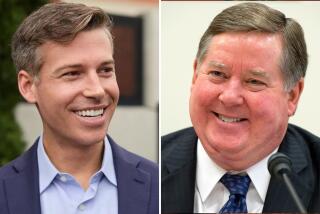Kim Runs Low-Key Campaign in Face of Federal Investigation : Congress: Political damage from probe of ’92 election finances seems to have been minimal, say observers. Democratic opponent faces severe disadvantages in funding and voter registration.
Rep. Jay Kim (R-Diamond Bar) is still under investigation for possible violations of federal election, tax and labor laws in connection with his 1992 campaign, but the congressman is running for reelection as if he doesn’t have a worry in the world.
Kim has not personally engaged his Democratic opponent in debate, declining to share the dais at several candidates’ forums in recent weeks. And as of midweek, he had run cable television ads touting his record but had not sent out a single campaign mailer.
According to political scientists and consultants, Kim apparently can afford to run a low-key campaign against Democrat Ed Tessier in the 41st District, which includes parts of Los Angeles, San Bernardino and Orange counties.
To start, registration in the district is 48% Republican to 39% Democrat, considered a sizable advantage because Republicans typically turn out to vote at higher rates than Democrats.
In addition, Kim has been able to raise significantly more money than Tessier. As of Sept. 30, Kim had raised about $650,000, including about $125,000 since the primary, according to his campaign disclosure statement. Tessier had raised about $34,000.
And the political damage the federal investigation has inflicted on Kim appears to have been minimal because no charges have been filed so far.
The way the experts see it, Kim’s legal problems opened the door for a challenge. But Tessier, a moderate Democrat who at 27 has never held public office, does not have the name recognition or money to walk through it. Outside his hometown of Pomona, Tessier, a quadriplegic, is best known for championing the rights of the disabled.
“I see very little sign of Tessier’s candidacy,” said political scientist Alan Heslop of Claremont McKenna College.
Nevertheless, Tessier continues to debate empty chairs, make appearances at community events and put in hours on the phone trying to raise money and support for his underdog candidacy.
He hammers on Kim for the possible violations of federal law.
“He bought his image. He bought his reputation.” Tessier said of Kim, who was a little-known Diamond Bar councilman when he first ran for Congress in 1992.
Kim became the target of the federal probe last summer after The Times reported that he secretly used about $480,000 from his engineering corporation to finance his 1992 federal campaign. Despite a prohibition on corporate contributions to federal campaigns, JayKim Engineers Inc. provided Kim’s campaign with free rent, staff and office supplies, according to internal company records and checks signed by Kim that were obtained by The Times.
Kim, who did not respond to various requests for interviews by The Times, has told other newspapers that, at most, he is guilty of only a technical violation.
Tessier also criticizes Kim for presenting himself as a Republican with moderate leanings in the 1992 campaign. Kim campaigned in support of abortion rights, for example, but once in Washington, voted against various pieces of abortion rights legislation, including a bill to lift the ban on fetal tissue research.
Kim also campaigned in support of a waiting period on the purchase of handguns and controls on semiautomatic weapons, but he voted against the Brady bill, which requires a waiting period before handguns can be purchased. Kim also opposed the recently passed crime bill, which bans 19 types of assault-style weapons.
“Jay Kim ran as a moderate Republican in 1992,” Tessier said. “His voting record is 100% radical right.”
Kim’s recent television commercials proclaim a strong stance against illegal immigration. Kim favors cutting off health care and educational benefits to illegal immigrants and supports using the National Guard to seal the U.S.-Mexico border.
“It’s a conservative district, and Jay Kim is very much in step with his district,” said Sandra Garner, Kim’s chief of staff.
Garner also noted that Kim, who is on the House Public Works and Transportation Committee, has secured funding for projects in his district. That includes grants totaling $11.3 million for improvements to airports in Chino and Ontario.
Like Kim, Tessier supports using the National Guard to secure the border, but he would not deny schooling or health care to illegal immigrants.
“Truancy causes crime,” Tessier said of denying schooling. Cutting off health care would “increase health problems generally, and the state’s health care costs would rise dramatically.”
Tessier said he supports welfare reform, including work requirements, as well as gun control and abortion rights. He also proposes universal health care coverage financed by so-called sin taxes and not by employer contributions.
The challenger, who heads his family’s Pomona-based development company, serves on the Pomona Planning Commission and is president of the city’s Central Business District.
More to Read
Get the L.A. Times Politics newsletter
Deeply reported insights into legislation, politics and policy from Sacramento, Washington and beyond. In your inbox three times per week.
You may occasionally receive promotional content from the Los Angeles Times.










